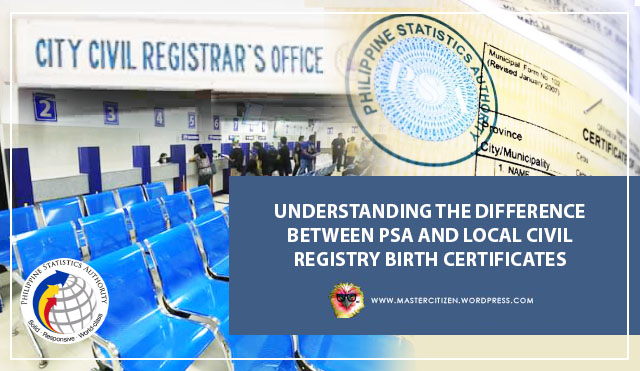Securing Civil Registry Documents: Tips For Protecting Your Identity
Civil registry documents play a vital role in establishing identity and legal status. These documents serve as official records of an individual’s birth, marriage, and death, providing crucial information about their personal background.
Birth certificates, for instance, are often required to
prove age, citizenship, and eligibility for various rights and benefits, such
as education, healthcare, and social services. Marriage certificates validate
the legal union between two individuals and are necessary for claiming spousal
rights and benefits. Similarly, death certificates serve as proof of a person’s
passing and are essential for handling legal matters, settling estates, and
obtaining life insurance benefits. Overall, civil registry documents provide a
legal foundation for identity verification and are frequently required in
official transactions, legal proceedings, and government applications.
That is why, mishandling or losing civil registry documents
can expose individuals to a range of potential risks that can significantly
impact their lives. Firstly, the loss or theft of these documents can lead to
identity theft, as the personal information contained within them can be
exploited by malicious individuals for fraudulent activities. This can result
in financial loss, damaged credit, and even legal troubles due to crimes
committed in the victim’s name. Furthermore, misplacing civil registry
documents can cause administrative hurdles and delays in important
transactions, such as obtaining a passport, enrolling in educational
institutions, or claiming legal entitlements. In some cases, individuals may
face difficulties proving their legal identity, leading to limited access to
essential services and rights. It is crucial to understand the potential risks
involved and take proactive measures to safeguard civil registry documents to
mitigate these potential threats to one’s identity and well-being.
In this blog post, our aim is to provide you with practical
knowledge and effective strategies to safeguard your civil registry documents
and protect your identity. We seek to equip you with the tools necessary to
secure your civil registry documents, ensuring peace of mind and safeguarding
your personal information. Whether you are concerned about identity theft or simply
want to be prepared for emergencies, this blog will serve as your comprehensive
guide to keeping your civil registry documents safe and protecting your
identity from potential threats.
Keep Hard Copies of Your Civil Registry Documents Safe
The PSA imposes strict identification and authorization
requirements for individuals requesting civil registry documents for a reason.
While birth, marriage, and death certificates are categorized as public
documents, it is crucial to exercise caution in their distribution. Preserving
the security of these documents is paramount. Ensure that you store them in a
secure location within your home, office, or place of business. Additionally,
maintain a record of the individuals and organizations to whom you have provided
copies of these documents. By doing so, you can maintain better control over
the dissemination of your personal information and enhance the protection of
your identity.
Utilize Secure Storage Solutions
One convenient option to consider is capturing a photograph
or maintaining a scanned copy of your PSA certificate within your personal
files. Many establishments and application processes now accept scanned
versions of PSA certificates, making it advantageous to have a digital copy
readily available. However, like safeguarding the physical version of your PSA
certificate, it is equally crucial to secure the digital copies stored on your
devices or cloud storage. Implementing strong passwords and additional
verification procedures will help fortify your digital files against potential
hackers and unauthorized access, ensuring the protection of your sensitive
information. Prioritizing the security of both physical and digital copies of
your PSA certificate will provide you with added peace of mind regarding the confidentiality
and integrity of your civil registry document.
Practice Responsible Sharing
Never share a photo or video of your PSA certificate online.
Be wary of sharing your personal information unnecessarily such as using your
PSA birth certificate instead of a valid ID when asked for a valid ID. Avoid
leaving your PSA certificates unattended such as inside your vehicle where
anyone may simply peer into your windows and see the contents of your civil
registry documents; or on your office table where anyone at the office may see
it, take a photo, or steal it.
Personally Receive Your Home-delivered PSA Certificates
When you order via PSAHelpline.ph, you may only order your
own PSA certificates, or those of your parents’ or children’s. When receiving
the documents on the day of delivery, only you – as the owner or authorized
requester – may receive the documents from the courier. To ensure a secure
transaction, the recipient must present valid identification cards and relevant
documents as proof of their identity. PSAHelpline does not accept authorization
letters from requesters or owners of the documents, regardless of whether the
authorized person is an immediate family member, spouse, or household member.
This strict policy guarantees that applicants can trust their PSA certificates
are exclusively accessed by authorized individuals, even though they can now be
conveniently ordered online.
Safeguarding your civil registry documents is paramount to
protecting your identity. By adhering to these tips and being mindful of the
potential risks involved, you can take proactive measures to ensure the
confidentiality and integrity of your personal information. Do not let your
valuable documents fall into the wrong hands – take control, stay vigilant, and
keep your identity protected. By staying informed and taking necessary
precautions, you can confidently navigate the digital landscape while keeping
your identity safe and secure.




Comments
Post a Comment